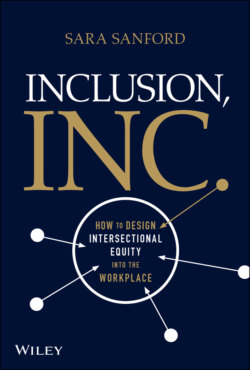Читать книгу Inclusion, Inc. - Sara Sanford - Страница 26
Diversity Trainings: Issuing Moral Licenses
ОглавлениеTo better understand where trainings go wrong, let's look at a study examining a phenomenon that confused political pundits following the 2016 election: Obama voters who voted for Trump.
Daniel Effron, a psychologist at the London School of Business, pioneered a study focused on people who publicly self-identified as supporters of Barack Obama. He found that not only did voting for Obama fail to indicate that the voters would be racially open in the future or continue to vote for progressive legislation, it could indicate the opposite—if those voters had a chance to let people know they voted for Obama.15
In two studies that yielded the same results, participants were asked to decide between equally qualified white and Black candidates to fill a hypothetical role. The participants—most of whom were white or Asian, and all of whom supported Obama—were divided into two groups. One group was allowed to openly endorse Obama before being given the study scenario. The other group wasn't.
Those who could not express their support for Obama before making a hiring decision tended to play it safe, saying that either candidate would be equally suited for the job. Those who had been allowed to openly endorse Obama before making a hiring decision were more likely to pick the white candidate for the job.
Another test explored the behaviors of those who harbored prejudice toward Black people. Effron's team used the Modern Racism Scale, which gauges people's racial attitudes, to identify participants who voted for Obama despite harboring negative feelings about Black people. These participants were given a scenario in which local government money could be given to two private organizations. One organization served a Black community, the other, a white one.
The subjects—who again were mostly white or Asian Obama supporters but who also backed Kerry in the 2004 presidential election—were split into two groups. One group was only given an opportunity to openly endorse Kerry, while the other group was only given an opportunity to endorse Obama.
When participants with more negative attitudes toward Black people, according to the Modern Racism Scale, had the opportunity to say they supported Obama, they allotted more money to the white organization than those who could only endorse Kerry.
What Effron and his team observed was a classic case of moral licensing. When those who harbored prejudicial attitudes were able to acquire moral capital by endorsing Obama, they felt more comfortable acting on prejudices that favor white people. It's the equivalent of saying “I have a Black friend” before making a statement that favors white people, to absolve oneself of the consequences of saying something prejudiced. Those who harbor prejudices feel they have more permission when saying something racially questionable, because they believe they've already proven through a different action that they're racially open.
This psychological mechanism is present in many parts of our lives, in ways that have nothing to do with race, gender, or bias. Classic examples include eating a donut because we ran an extra mile on the treadmill, or feeling okay about buying from a morally questionable but convenient business because we went to church yesterday. We provide mental loopholes for ourselves that justify certain behaviors, even if it doesn't lessen their consequences. These examples only sabotage small goals in our own lives, but moral licensing can wreak havoc in the workplace, especially following diversity trainings.
These trainings can actually amplify our tendency to morally license poor behaviors that will disproportionately impact women, people of color, and other underestimated groups. The training becomes the “good deed” we do now, that unconsciously makes us feel freer to do something less virtuous later. As we've seen in the Obama voter studies, this impulse to morally license one's own biased behaviors is even stronger in more prejudiced people—typically, the exact audience that trainings are intended for. Trainings provide an “out” for those who need the trainings the most. Employees who already hold discriminatory views feel they've earned a sense of protection from being accused of being prejudiced by acquiring their “I attended a training” certificate. They treat their accumulation of moral capital as a visible shield for themselves, rather than the beginning of a journey to becoming less biased in their behaviors.
